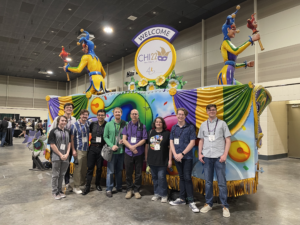 Part of the mission of the College of Business and SITC is to offer students opportunities for holistic learning and development through activities like research and involvement with student organizations. One of the student organizations that has been very active and seen great success is the ACU chapter of SIGCHI. SIGCHI is an acronym that stands for Special Interest Group in Computer-Human Interaction. It is one of the largest ACM SIGs and ACU SITC students run an official local chapter of SIGCHI. What makes this especially impressive is that there are only two local chapters in Texas, the other being at Texas A&M. Students had the opportunity to attend the annual CHI conference in New Orleans, LA this May as they presented their research.
Part of the mission of the College of Business and SITC is to offer students opportunities for holistic learning and development through activities like research and involvement with student organizations. One of the student organizations that has been very active and seen great success is the ACU chapter of SIGCHI. SIGCHI is an acronym that stands for Special Interest Group in Computer-Human Interaction. It is one of the largest ACM SIGs and ACU SITC students run an official local chapter of SIGCHI. What makes this especially impressive is that there are only two local chapters in Texas, the other being at Texas A&M. Students had the opportunity to attend the annual CHI conference in New Orleans, LA this May as they presented their research.
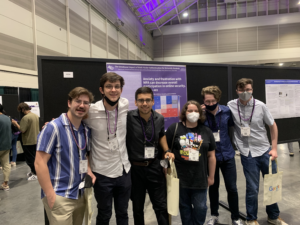 The annual CHI conference is the largest and premiere international venue for Human-Computer Interaction research in the world. The conference includes a Student Research Competition which requires students to submit papers on original research and is peer-reviewed. ACU SIGCHI has been accepted 4 out of the last 5 years. In most years, the competition is mainly from big R1 universities. This is the first year that ACU has placed and was awarded an impressive 3rd place beating out larger universities, such as Oxford and the University of Michigan. Student participants in the conference were Garrett Powell, Michael Thorson, Davis Arnold, Anthony Moncivais, Megan Skeen, Nathan Wade, and Brendan Gipson sponsored and accompanied by faculty members Dr. James Prather and Dr. Brent Reeves.
The annual CHI conference is the largest and premiere international venue for Human-Computer Interaction research in the world. The conference includes a Student Research Competition which requires students to submit papers on original research and is peer-reviewed. ACU SIGCHI has been accepted 4 out of the last 5 years. In most years, the competition is mainly from big R1 universities. This is the first year that ACU has placed and was awarded an impressive 3rd place beating out larger universities, such as Oxford and the University of Michigan. Student participants in the conference were Garrett Powell, Michael Thorson, Davis Arnold, Anthony Moncivais, Megan Skeen, Nathan Wade, and Brendan Gipson sponsored and accompanied by faculty members Dr. James Prather and Dr. Brent Reeves.
The students decided to use a real-life issue from the ACU campus as the basis for their research. We asked Dr.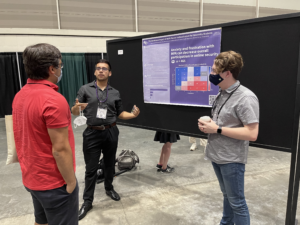 James Prather, the sponsor for the chapter, to tell us about their research plan. “During 2021, ACU Information Technology rolled out multi-factor authentication. It’s no longer enough to have your username and password; now you also need a secondary method of authentication such as text, call, or app. This is becoming more common and helps secure accounts from phishing attacks. The SIGCHI students decided to study the rollout and learn more about the security gains from an organizational perspective vis-à-vis student user experience. We wanted to discover whether or not mandatory multi-factor authentication negatively impacted student user experience enough to compromise other parts of the security ecosystem, such as strong passwords.”
James Prather, the sponsor for the chapter, to tell us about their research plan. “During 2021, ACU Information Technology rolled out multi-factor authentication. It’s no longer enough to have your username and password; now you also need a secondary method of authentication such as text, call, or app. This is becoming more common and helps secure accounts from phishing attacks. The SIGCHI students decided to study the rollout and learn more about the security gains from an organizational perspective vis-à-vis student user experience. We wanted to discover whether or not mandatory multi-factor authentication negatively impacted student user experience enough to compromise other parts of the security ecosystem, such as strong passwords.”
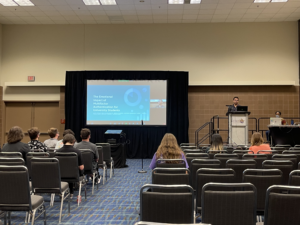 While presenting the paper was the ultimate goal of the conference, students learned a great deal from the entire process. Senior computer science major Megan Skeen noted that the experience had impacts far beyond the conference. “I learned how much work goes into these sorts of projects and what the expectations are for this type of research. I also did not realize how much of this is helpful for securing work after graduation, from networking opportunities to being able to put your research on your resume.” Senior digital entertainment technology and computer science major, Michael Thorson also saw that their topic was one that many were interested in, saying, “I did not expect the scope of research and interest in MFA to be as large as it was. Through the entire research process, I learned the ongoing design issues with it, as well as the current studies and design processes dedicated to improving its security and usability. In a larger sense, I became familiar with the field of HCI and how it’s always changing and expanding in every aspect.”
While presenting the paper was the ultimate goal of the conference, students learned a great deal from the entire process. Senior computer science major Megan Skeen noted that the experience had impacts far beyond the conference. “I learned how much work goes into these sorts of projects and what the expectations are for this type of research. I also did not realize how much of this is helpful for securing work after graduation, from networking opportunities to being able to put your research on your resume.” Senior digital entertainment technology and computer science major, Michael Thorson also saw that their topic was one that many were interested in, saying, “I did not expect the scope of research and interest in MFA to be as large as it was. Through the entire research process, I learned the ongoing design issues with it, as well as the current studies and design processes dedicated to improving its security and usability. In a larger sense, I became familiar with the field of HCI and how it’s always changing and expanding in every aspect.”
As students become involved in opportunities like this, the seed is planted for the possibility of more research in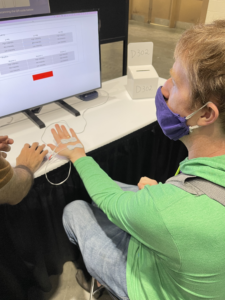 their undergrad or possibly post-grad education. The experience definitely changed Thorson’s mind. “The process of research was always interesting to me, but I wouldn’t have wanted to pursue it more before this experience. Being able to find data that’s actually useful to the world and share it with people who understand and are interested is massively rewarding. Research is definitely something that I at least want to contribute to in the future.” Senior information systems major Nate Wade agreed, saying, “The SIGCHI conference absolutely inspired me to want to do more research involving human-computer interaction. Having the opportunity to share our research with highly skilled professionals was a huge blessing on my life and I hope to do more research in the future.”
their undergrad or possibly post-grad education. The experience definitely changed Thorson’s mind. “The process of research was always interesting to me, but I wouldn’t have wanted to pursue it more before this experience. Being able to find data that’s actually useful to the world and share it with people who understand and are interested is massively rewarding. Research is definitely something that I at least want to contribute to in the future.” Senior information systems major Nate Wade agreed, saying, “The SIGCHI conference absolutely inspired me to want to do more research involving human-computer interaction. Having the opportunity to share our research with highly skilled professionals was a huge blessing on my life and I hope to do more research in the future.”
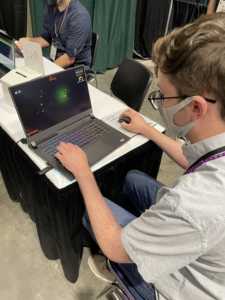 While it may seem daunting for students to present their research in front of industry experts, the ACU SIGCH group found validation and encouragement. Senior information systems major Davis Arnold said, “Having people already working within the industry and telling us that the research that we presented was something that they had been wanting to see was rewarding; it showed us that all the work that we put into our research was completely worth it.” Skeen agreed and added, “Seeing our research be presented and people interested in our poster was validating; this was something that other people were interested in, rather than just us. Being able to actually be there in person made the work that we had been doing over the course of the previous semesters more tangible.”
While it may seem daunting for students to present their research in front of industry experts, the ACU SIGCH group found validation and encouragement. Senior information systems major Davis Arnold said, “Having people already working within the industry and telling us that the research that we presented was something that they had been wanting to see was rewarding; it showed us that all the work that we put into our research was completely worth it.” Skeen agreed and added, “Seeing our research be presented and people interested in our poster was validating; this was something that other people were interested in, rather than just us. Being able to actually be there in person made the work that we had been doing over the course of the previous semesters more tangible.”
As well as receiving a boost in confidence in their research abilities, presenting the paper also offered a new perspective. Thorson said, “Other researchers were actively interested in our research and its implications for design and usability in regards to multi-factor authentication. In the process of presenting, we came across new questions we hadn’t asked, and even more ways to expand on the research than we already planned.”
When students have the opportunity to attend a professional conference, it gives them a glimpse into their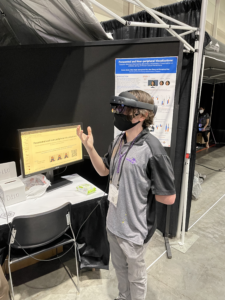 potential future careers as they see how large the community is that they are now a part of. Arnold found himself awed at the opportunity saying, “Being able to be a contributing and recognized part of something so much bigger than ourselves was both humbling and a valuable experience.” For Skeen, the possibility of continuing her education post-graduation is something that is now on her radar. “Seeing all of the research that was taking place from around the world was interesting, and seeing what the next steps could be if we decide to pursue this type of research in graduate school definitely made the option seem more available to us.” She also realized how her research will direct her professional goals. “Software should be designed with the user in mind, making something intuitive enough that it can actually be used without causing stress. Being able to see how this was applied in the conference, how we’re learning the best ways to make things more usable, really brought the work we had done in our classes to life and showed how we could think about HCI outside of the classroom. I will keep that in mind as I work on software in the future, using this research to make the applications that I create more usable.”
potential future careers as they see how large the community is that they are now a part of. Arnold found himself awed at the opportunity saying, “Being able to be a contributing and recognized part of something so much bigger than ourselves was both humbling and a valuable experience.” For Skeen, the possibility of continuing her education post-graduation is something that is now on her radar. “Seeing all of the research that was taking place from around the world was interesting, and seeing what the next steps could be if we decide to pursue this type of research in graduate school definitely made the option seem more available to us.” She also realized how her research will direct her professional goals. “Software should be designed with the user in mind, making something intuitive enough that it can actually be used without causing stress. Being able to see how this was applied in the conference, how we’re learning the best ways to make things more usable, really brought the work we had done in our classes to life and showed how we could think about HCI outside of the classroom. I will keep that in mind as I work on software in the future, using this research to make the applications that I create more usable.”
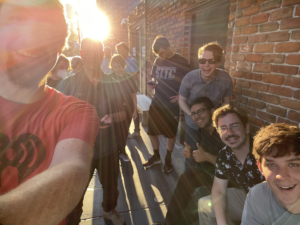 The ACU SIGCHI group is excited to take on another project for the next conference. Davis Arnold summed up the highlight of the group’s experience and what their next goal is, saying, “Getting the chance to network with like-minded people and getting the chance to see their research contributions. It was also incredibly exciting to see our own research stand up on its own, earning us third place in the student research competition. We are hoping to put together an even better paper in this coming year and hope to win it all at the CHI 2023 conference in Hamburg, Germany!” Dr. James Prather hopes that the students find not only success but inspiration as well. “I hope they were able to see and understand what it takes to be at the next level. They were in awe of the presentations by graduate students and I hope it inspires them as they prepare for next year’s research study.”
The ACU SIGCHI group is excited to take on another project for the next conference. Davis Arnold summed up the highlight of the group’s experience and what their next goal is, saying, “Getting the chance to network with like-minded people and getting the chance to see their research contributions. It was also incredibly exciting to see our own research stand up on its own, earning us third place in the student research competition. We are hoping to put together an even better paper in this coming year and hope to win it all at the CHI 2023 conference in Hamburg, Germany!” Dr. James Prather hopes that the students find not only success but inspiration as well. “I hope they were able to see and understand what it takes to be at the next level. They were in awe of the presentations by graduate students and I hope it inspires them as they prepare for next year’s research study.”
